| A | aburaage, aburage | 油揚げ、油揚 (kanji + hiragana, kanji)pronunciation | |
| agemochi | 揚げ餅 (kanji + hiragana)pronunciation | A snack food of deep-fried rice cake (mochi). | |
| aho | アホ、阿呆 (katakana, kanji)pronunciation | Meaning idiot. The word is often said with feelings of the friendly feeling. | |
| aikidou | 合気道 (kanji)pronunciation | A Japanese martial art which two athletes fight barehanded without using a weapon. | |
| aiueo | あいうえお (hiragana)pronunciation | The Japanese syllabary system. Phonogram. | |
| akachôchin | 赤提灯 (kanji)pronunciation | A Japanese-style cheap pub. | |
| ama | 海女 (kanji)pronunciation | Women for collecting shellfish diving into the sea. | |
| amaguri | 甘栗 (kanji)pronunciation | Meaning "sweet roasted chestnuts". | |
| amanattô | 甘納豆 (kanji)pronunciation | The cake which boiled down a bean sweetly. | |
| amazake | 甘酒 (kanji)pronunciation | A traditional sweet, low-alcohol drink. | |
| amezaiku | 飴細工 (kanji)pronunciation |  A cake to form by hand work with heated candy. A cake to form by hand work with heated candy. | |
| an | 餡、あん (kanji, hiragana)pronunciation | Meaning "very sweet red bean paste". | |
| andon | 行灯 (kanji)pronunciation |  A lamp consisting of paper stretched over a frame of bamboo, wood or metal. A lamp consisting of paper stretched over a frame of bamboo, wood or metal. | |
| anmitsu | あんみつ (hiragana)pronunciation | The cold cake which hung sugared water in red bean paste, agar, the rice cake. | |
| anpan | あんパン (hiragana + katakana)pronunciation |  A bread which enclosed red bean paste. A bread which enclosed red bean paste. | |
| aonori | 青ノリ、青海苔 (kanji + katakana, kanji)pronunciation | A green laver powder. | |
| arare | あられ (hiragana)pronunciation | A bite-sized Japanese rice cracker. | |
| arigatô | ありがとう (hiragana)pronunciation | Meaning "thanks". | |
| atsuage | 厚揚げ (kanji + hiragana)pronunciation | A very thick aburaage (deep-fried tofu). | |
| awabi | 鮑、あわび (kanji, hiragana)pronunciation | Meaning Abalone. | |
| Awa odori | 阿波踊り (kanji + hiragana)pronunciation | ||
| azuki bean, adzuki bean | 小豆、アズキ (kanji, katakana)pronunciation | A small crimson colored bean. | |
| B | baka | バカ、馬鹿 (katakana, kanji)pronunciation | Meaning idiot. |
| bancha | 番茶 (kanji)pronunciation | The low class tea which is harvested after having harvested "sencha". | |
| banzai | 万歳 (kanji)pronunciation |  A Japanese unique expression that shows their win, success, configuration, happiness etc. A Japanese unique expression that shows their win, success, configuration, happiness etc. | |
| barazoku | 薔薇族 (kanji)pronunciation | The word to mean homosexuals of the man. | |
| batta mon | バッタもん (katakana + hiragana)pronunciation | Products of non-regular. | |
| benishôga | 紅生姜 (kanji)pronunciation | Red pickled ginger. | |
| bentô | 弁当 (kanji)pronunciation |  A box for carrying to put a meal for the one in. A box lunch. A box for carrying to put a meal for the one in. A box lunch. | |
| bimajo | 美魔女 (kanji)pronunciation | The woman who keeps outstanding beauty middle-aged. | |
| bishôjo | 美少女 (kanji)pronunciation | Meaning "beautiful young girl". | |
| bishônen | 美少年 (kanji)pronunciation | Meaning "beautiful young boy". | |
| biwa | 琵琶 (kanji)pronunciation | A Japanese four-stringed musical instrument like a lute. | |
| boke | ボケ (katakana)pronunciation | Meaning "idiot". | |
| bon odori | 盆踊り (kanji + hiragana)pronunciation | Dances of summer festival. | |
| bonsai | 盆栽 (kanji)pronunciation |  Japanese miniature potted tree (plant). Japanese miniature potted tree (plant). | |
| botamochi | ぼたもち、牡丹餅 (kanji, hiragana)pronunciation | Sweets made with rice and sweet red bean paste. Also known as ohagi. | |
| budô, bujutsu | 武道、武術 (kanji)pronunciation | The technique that a samurai learns for a fight. Judô, kendô and kyûdô. | |
| bumbetsu gomi station | 分別ゴミステーション (kanji + katakana)pronunciation | Place to dispose of scrap that has been fractionated. | |
| bunraku | 文楽 (kanji)pronunciation | A form of traditional Japanese puppet play. | |
| burikko | ぶりっ子 (hiragana + kanji)pronunciation | A women to imitate the cute girl. | |
| bushidô | 武士道 (kanji)pronunciation | The traditional military code of the samurai. | |
| busu | ブス (katakana)pronunciation | A kind of abusing word. Meaning "Ugly-looking women". | |
| butaman | 豚まん (kanji + hiragana)pronunciation |  A sweet bun which is made from flour dough and pork. A sweet bun which is made from flour dough and pork. | |
| byôbu | 屏風 (kanji)pronunciation |  Japanese folding screens which is made from several joined panels. Japanese folding screens which is made from several joined panels. | |
| C | chaku mero | 着メロ (kanji + katakana)pronunciation | A ringing melody for incoming calls. |
| chanbara, chambara | チャンバラ (katakana)pronunciation | The battle action by the Japanese sword. | |
| chanoyu | 茶の湯 (kanji + hiragana + kanji)pronunciation | Also called sadou. The tea ceremony. | |
| chashitsu | 茶室 (kanji)pronunciation | The small room that is used for tea ceremony. | |
| chawan | 茶碗 (kanji)pronunciation | A ceramic bowl used for eating rice. | |
| chawanmushi | 茶碗蒸し (kanji + hiragana)pronunciation | One of the Japanese foods. The egg soup which it was sultry, and became hard. | |
| chikuwa | チクワ、竹輪 (katakana, kanji)pronunciation |  The processed food of mashed white fish meat. The processed food of mashed white fish meat. | |
| chimaki | ちまき、粽 (hiragana, kanji)pronunciation | A traditional Japanese food, made of glutinous rice wrapped in bamboo leaves. | |
| chindon'ya | ちんどん屋 (katakana + kanji)pronunciation |  Street musicians who parade around a town while playing music for advertising. Street musicians who parade around a town while playing music for advertising. | |
| chirigami kôkan | チリ紙交換 (katakana + kanji)pronunciation | The supplier who takes over paper. They leave a tissue as an exchange. | |
| chirimenjako | ちりめんじゃこ (hiragana)pronunciation | Dried young sardines. | |
| chirimon | チリモン (katakana)pronunciation | Generic name of the small animals which got mixed with chirimenjako (dried young sardines). | |
| chiyogami | 千代紙 (kanji)pronunciation | The small paper with the design of a Japanese-style design. | |
| chôchin | 提灯 (kanji)pronunciation |  Japanese lantern. The lighting equipment which was made with bamboo and paper. Japanese lantern. The lighting equipment which was made with bamboo and paper. | |
| chonmage | ちょんまげ (hiragana)pronunciation | The hairstyle of the man who was common in the Edo era. | |
| Chûshingura | 忠臣蔵 (kanji)pronunciation | The story of 47 subordinates to retaliate for the lord who committed harakiri. | |
| D | dagashi | 駄菓子 (kanji)pronunciation | Cheap sweets of the unit price that children buy. |
| daifukumochi | 大福餅 (kanji)pronunciation | Rice cake stuffed with sweetened bean jam. | |
| daikon | 大根 (kanji)pronunciation | 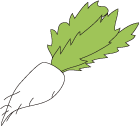 A kind of vegetables of the radish that a root became huge. A kind of vegetables of the radish that a root became huge. | |
| daikon oroshi | 大根おろし (kanji + hiragana)pronunciation | Grated Japanese radish. | |
| daiku | 第九 (kanji + hiragana)pronunciation | The symphony ninth which Beethoven composed. Many concerts are held in December in Japan. | |
| dajare | 駄洒落、ダジャレ (kanji, katakana)pronunciation | A pun. | |
| dango | 団子 (kanji)pronunciation |  A Japanese dumpling made from mochiko (rice flour). A Japanese dumpling made from mochiko (rice flour). | |
| dangô | 談合 (kanji)pronunciation | Conference on the bidding. Collusion. | |
| daruma | 達磨、ダルマ (kanji, katakana)pronunciation |  The red figurehead which looked dignified. The red figurehead which looked dignified. | |
| dashi | だし、出汁 (hiragana, kanji)pronunciation | A class of soup and cooking stock used in Japanese cuisine. | |
| dashimaki | だし巻き (hiragana + kanji + hiragana)pronunciation | Rolled omelette. | |
| depachika | デパ地下 (katakana + kanji)pronunciation | The underground Delicatessen section of the department store. | |
| dohyô | 土俵 (kanji)pronunciation | The ring in which sumo wrestling bouts are held. | |
| dôjou | 道場 (kanji)pronunciation | The holy place that the athlete of the martial arts takes a lesson of. | |
| donburi | どんぶり、丼 (hiragana, kanji)pronunciation | A bowl of the ceramics to put rice and a side dish. | |
| dorayaki | どら焼き (hiragana, hiragana + kanji + hiragana) pronunciation | The pancake which sandwiched red sweet bean paste. | |
| dôsojin | 道祖神 (kanji)pronunciation | Stone statue and monument in the roadside. | |
| dotakyan | ドタキャン (katakana)pronunciation | Last-minute cancellation. | |
| dôyô | 童謡 (kanji)pronunciation | Songs that were made for children. | |
| E | ebi furai | エビフライ (katakana)pronunciation |  Fried prawns. Fried prawns. |
| ebisen | えびせん (hiragana)pronunciation | A rice cracker with the powder of prawns. | |
| ebiten | エビ天 (katakana + kanji)pronunciation | 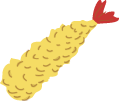 Tempura of prawns. Tempura of prawns. | |
| ecchi, etchi | エッチ (katakana)pronunciation | Meaning "lewd", "sexy", "lascivious", or "naughty". | |
| edamame | 枝豆 (kanji)pronunciation | The unripe soybean which was boiled. | |
| ekiben | 駅弁 (kanji)pronunciation | Lunch pack that are selling at the station. | |
| ekiden | 駅伝 (kanji)pronunciation | Field and track events to run a long distance in a relay. Road reley. | |
| ekinaka | 駅ナカ (kanji + katakana)pronunciation | A retail shop found inside a railroad station. | |
| ema | 絵馬 (kanji)pronunciation |  A tablet to dedicate to the Shintô shrine. A tablet to dedicate to the Shintô shrine. | |
| emoji | 絵文字 (kanji)pronunciation | An ideogram used in an electronic message or on a Web page. | |
| enka | 演歌 (kanji)pronunciation | A genre of Japanese popular songs. A tragic nuance is strong in them. | |
| eto | 干支 (kanji)pronunciation | A superstition to apply one year to one animal in a period for 12 years. | |
| F | fu | 麩 (kanji)pronunciation | The food which was made from gluten of the flour. |
| fudepen | 筆ペン (kanji + katakana)pronunciation |  The Japanese brush which I can supplement with the ink. The Japanese brush which I can supplement with the ink. | |
| fugu | 河豚、フグ (kanji,katakana)pronunciation | Meaning "globefish" or "swellfish". | |
| fugu chôchin | ふぐ提灯 (hiragana + kanji)pronunciation | Blowfish lantern. | |
| fuki | 蕗、フキ (kanji, katakana)pronunciation | Butterbur. The wild grass which a bud and a stem can eat. | |
| fukubukuro | 福袋 (kanji)pronunciation | Bargain products set which is sold with hiding the contents. | |
| fukujinzuke | 福神漬 (kanji)pronunciation | Pickles which I soaked with soy sauce. | |
| furikome sagi | 振り込め詐欺 (kanji + hiragana + kanji + hiragana + kanji) pronunciation | Money transfer fraud. | |
| fûrin | 風鈴 (kanji)pronunciation | 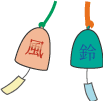 A Wind bell. A Wind bell. | |
| furisode | 振袖 (kanji)pronunciation | A formal kimono for women. | |
| furoshiki | 風呂敷 (kanji)pronunciation | Cloths of a square for packing. | |
| fûryu | 風流 (kanji)pronunciation | The words indicating a casual sense of beauty. | |
| fusuma | 襖 (kanji)pronunciation | Panels which divides a room. It slides aside, and a person goes in and out. | |
| futon | 布団 (kanji)pronunciation | A thick mattress for a person to sleep. | |
| G | gachapon | ガチャポン (katakana)pronunciation |  A capsule toy that come out from the vending machine. A capsule toy that come out from the vending machine. |
| gagaku | 雅楽 (kanji)pronunciation | A type of Japanese classical music. | |
| gaijin | 外人 (kanji)pronunciation | A Japanese word meaning "foreigner" or "outsider". | |
| ganmodoki | がんもどき (hiragana)pronunciation | A fried tofu fritter. | |
| gari | ガリ (katakana)pronunciation | A type of pickled vegetables. It is sweet, thinly sliced young ginger. | |
| geisha, geiko | 芸者、芸子 (kanji)pronunciation | Female entertainers who offers an entertainment to the visitor drinking liquor. | |
| genmaicha | 玄米茶 (kanji)pronunciation | The green tea which blended roast brown rice. | |
| geta | 下駄 (kanji)pronunciation |  Simple-shaped wooden sandals. Simple-shaped wooden sandals. | |
| ginjôshu | 吟醸酒 (kanji)pronunciation | The sake which was made from good-quality rice. | |
| ginnan | 銀杏、ギンナン (kanji, katakana)pronunciation | Meaning "ginkgo nuts". | |
| giri choko | 義理チョコ (kanji + katakana)pronunciation | A ceremonious present (chocolate). | |
| go, igo | 碁(囲碁) (kanji)pronunciation | A strategic board game for two players. | |
| gobô | 牛蒡、ゴボウ (kanji, katakana)pronunciation | Greater burdock, edible burdock, or lappa burdock. | |
| goboten | ゴボ天 (katakana + kanji)pronunciation | Tenpura of burdock root. | |
| gohan | ご飯 (kanji + hiragana)pronunciation | Meaning "boiled rice". | |
| Gokuraku | 極楽 (kanji)pronunciation | Shangri-la on the sky. | |
| goriyaku | ご利益 (hiragana + kanji)pronunciation | Divine favor. | |
| goshuin | 御朱印 (kanji)pronunciation | 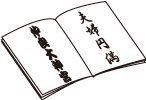 Stamp rally at shrines or temples. Stamp rally at shrines or temples. | |
| gôya, gôyâ | ゴーヤ、ゴーヤー (katakana, katakana)pronunciation |  A bitter gourd. Also called "nigauri". A bitter gourd. Also called "nigauri". | |
| gozan okuribi | 五山送り火 (kanji + hiragana + kanji) pronunciation | ||
| Glico no omake | グリコのおまけ (katakana + hiragana) pronunciation | Toys associated with the caramel of Glico. | |
| gyokuro | 玉露 (kanji)pronunciation | A fine and expensive type of green tea. | |
| gyôza | ギョーザ、餃子 (katakana, kanji)pronunciation |  Dumpling including ground meet and vegetable. Dumpling including ground meet and vegetable. | |
| gyûdonn | 牛丼 (kanji)pronunciation | The dish which beef was put on on rice. | |
| gyûhi | ぎゅうひ、求肥 (hiragana, kanji)pronunciation | Generic name for Japanese confectionery kneaded. | |
| gyûsuji | 牛スジ (kanji + katakana)pronunciation | Fibrous beef. | |
| H | haiku | 俳句 (kanji)pronunciation | A 17-sylable poem. |
| hakusai | 白菜 (kanji)pronunciation | The vegetables which resemble cabbage. The leaf is soft and is delicious. | |
| hamaru | ハマる (katakana + hiragana)pronunciation | Meaning "indulge in". | |
| hampen | はんぺん (hiragana)pronunciation | A white, square shaped surimi product. | |
| hanabiramochi | 花びら餅 (kanji + hiragana + kanji)pronunciation |  The Japanese sweet which sandwiched miso and the bean jam with a thin rice cake. The Japanese sweet which sandwiched miso and the bean jam with a thin rice cake. | |
| hanami | 花見 (kanji)pronunciation | The Japanese traditional custom of enjoying the beauty of flowers. | |
| hanashika | 噺家 (kanji)pronunciation | Professional Rakugo storyteller. Also known as rakugoka. | |
| haniwa | 埴輪 (kanji)pronunciation |  Terracotta clay figures which were made for ritual use and buried with the dead as funerary objects during the Kofun period (3rd to 6th century AD) of the history of Japan. Terracotta clay figures which were made for ritual use and buried with the dead as funerary objects during the Kofun period (3rd to 6th century AD) of the history of Japan. | |
| hannari | はんなり (hiragana)pronunciation | It is gorgeous and is refined. | |
| harakiri | ハラキリ (katakana)pronunciation | The own death of the samurai. Also known as "seppuku". | |
| harumaki | 春巻き (kanji)pronunciation | The deep-fried food which was wrapped in rice paper. | |
| hashioki | 箸置き (kanji + hiragana)pronunciation | Small tableware to put chopsticks on. | |
| hatsumôde | 初詣 (kanji)pronunciation | A custom to pray at the Shinto shrine at the beginning of one year. | |
| henohenomoheji | へのへのもへじ (hiragana)pronunciation | The face which is drawn by a hiragana letter. | |
| henohenomoheno | へのへのもへの (hiragana)pronunciation |  The face which was drawn by a hiragana characters. The face which was drawn by a hiragana characters. | |
| henro | 遍路 (kanji)pronunciation | A pilgrim. People around the temples and shrines of Shikoku. | |
| hentai | 変態 (kanji)pronunciation | Meaning "Pervert". People with curious sexual habits. | |
| hetauma | ヘタウマ (katakana)pronunciation | The attractive work which is not technical. | |
| hidoko | 火床 (kanji)pronunciation |  Fire basket at the great bonfire event at five mountain in Kyoto. Fire basket at the great bonfire event at five mountain in Kyoto. | |
| hijiki | ヒジキ (katakana)pronunciation | A brown sea vegetable growing wild on rocky coastlines. | |
| hikido | 引き戸 (kanji + hiragana + kanji)pronunciation | Door that is opened and closed by sliding. | |
| hikikomori | 引きこもり (kanji + hiragana)pronunciation | Young adults who withdraw from social life. | |
| hinamatsuri | 雛祭り (kanji + hiragana)pronunciation | An event to display a doll on March 3. | |
| hina ningyô | 雛人形 (kanji)pronunciation | 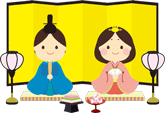 March dolls. March dolls. | |
| hinatabokko | ひなたぼっこ (hiragana)pronunciation | Basking in the sun. | |
| hinoki | ヒノキ (katakana)pronunciation | Japanese cypress. It smells nice. | |
| Hinomaru | 日の丸 (kanji + hiragana + kanji)pronunciation | The flag that was painted red sun on a white. It is not the Japanese flag legally. | |
| hinoyôjin | 火の用心 (kanji + hiragana + kanji)pronunciation | Looking out for fire. | |
| hiragana | ひらがな、平仮名 (hiragana, kanji)pronunciation | A Japanese syllabary, one component of the Japanese writing system. | |
| hiyamugi | 冷や麦 (kanji + hiragana + kanji)pronunciation | Thin wheat noodles cooled on ice. | |
| hôgaku | 邦楽 (kanji)pronunciation | Music of a traditional Japanese-style. | |
| hôko | 這子 (kanji)pronunciation |  A protective charm for babies, made as a doll in the form of a baby, and intended to take on any misfortune in the real baby's stead. A protective charm for babies, made as a doll in the form of a baby, and intended to take on any misfortune in the real baby's stead. | |
| hokora | 祠、ほこら (kanji, hiragana)pronunciation |  A miniature Shinto shrine. A miniature Shinto shrine. | |
| hokoten | ホコ天 (katakana + kanji)pronunciation | Vehicle-free promenade. | |
| honjôzôshu | 本醸造酒 (kanji)pronunciation | Sake to which an amount of jouzou alcohol (distilled alcohol) has been added to create a smoother and lighter flavor. | |
| horumon yaki | ホルモン焼き (katakana + kanji + hiragana) pronunciation | Cuisine of visceral. | |
| hoshigaki | 干し柿 (kanji + hiragana + kanji)pronunciation | 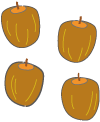 Dried persimmons. Dried persimmons. | |
| hoshiimo | 干しイモ (kanji + hiragana + katakana) pronunciation | A dried stem of a taro plant. | |
| hyakkin | 百均 (kanji)pronunciation | Grocery shop of one hundred yen goods. | |
| hyakkiyakô | 百鬼夜行 (kanji)pronunciation | A concept in Japanese folklore. Night parade of one hundred demons. | |
| hyaku monogatari | 百物語 (kanji)pronunciation | 100 Candles Game. Round of one hundred ghost stories at night. | |
| hyakunin isshu | 百人一首 (kanji)pronunciation | A classical Japanese anthology of one hundred Japanese waka by one hundred poets. | |
| hyôshigi | 拍子木 (kanji)pronunciation |  A simple Japanese musical instrument, consisting of two pieces of hardwood or bamboo that are connected by a thin ornamental rope. A simple Japanese musical instrument, consisting of two pieces of hardwood or bamboo that are connected by a thin ornamental rope. | |
| hyottoko | ひょっとこ、火男 (hiragana, kanji)pronunciation | The character have different eye size between left and right eyes, often wearing a scarf around his head. | |
| I | iaijutsu | 居合術 (kanji)pronunciation | Japanese martial art of drawing the sword. |
| ice monaka | アイスモナカ (katakana)pronunciation |  Ice cream is in the inside of the wafer. Ice cream is in the inside of the wafer. | |
| ichigo daifuku | いちご大福 (hiragana + kanji)pronunciation | It is the cake with the strawberry to the rice cake which I wrapped bean jam in. | |
| ichirinzashi | 一輪挿し (kanji + hiragana)pronunciation | A single‐flower vase. | |
| igo | 囲碁 (kanji)pronunciation | Another name for Go (board game). | |
| ika ring | イカリング (katakana)pronunciation | The cuttlefish which I cut into round slices. | |
| ikayaki | イカ焼き、烏賊焼 (katakana + kanji + hiragana, kanji) pronunciation | The roasted cuttlefish. Or the okonomiyaki with the cuttlefish. | |
| ikebana | 生け花 (kanj + hiragana + kanjii)pronunciation | The Japanese art of flower arrangement, also known as kado. | |
| ikemen | イケメン (katakana) | Good-looking man. | |
| iki | 粋 (kanji)pronunciation | A traditional aesthetic ideal of human behavior or volition in Japan, roughly "chic, stylish". | |
| imagawayaki | 今川焼き (kanji + hiragana)pronunciation | The pancake which sandwiched adzuki bean. | |
| imokenpi | 芋けんぴ (kanji + hiragana)pronunciation | Traditional Japanese snack food. Sweet potato sliced and fried in oil. | |
| inarizushi | 稲荷寿司 (kanji)pronunciation | A kind of the sushi. It is wrapped in fried tofu. | |
| inubaka | 犬ばか (kanji + hiragana)pronunciation |  It is people saying the following things. "My dog is the number one in the world" "I love a dog of my home most" It is people saying the following things. "My dog is the number one in the world" "I love a dog of my home most" | |
| ippon | 一本 (kanji)pronunciation | The words that an umpire issues when one athlete got a point by the martial arts. | |
| irootoko | 色男 (kanji)pronunciation | Meaning "Handsome man". | |
| iroha karuta | いろはカルタ (hiragana + katakana)pronunciation | A Japanese card game. The game that the person who found a read card gets a point. | |
| irohanihoheto | いろはにほへと (hiragana)pronunciation | The Japanese alphabet. | |
| ishiyaki imo | 石焼きイモ (kanji + hiragana + katakana)pronunciation | ||
| itamae | 板前 (kanji)pronunciation | A chef of the Japanese food. | |
| itasha | 痛車 (kanji)pronunciation | Decorative wrapping cars. | |
| itawasa | 板わさ (kanji + hiragana)pronunciation | Sliced kamaboko with shouyu and wasabi. | |
| itokonnyaku | 糸こんにゃく (kanji + hiragana)pronunciation | The konjac (the genus Amorphophallus) which was cut thin. | |
| izakaya | 居酒屋 (kanji)pronunciation | A Japanese-style pub. A Japanese tapas bar. | |
| J | janome gasa | 蛇の目傘 (kanji + hiragana + kanji)pronunciation | The umbrella with the midmost big circle design. |
| jidai geki | 時代劇 (kanji)pronunciation | Movies and dramas in Japan was the stage of the Edo period. | |
| jinbei, jinbe | 甚平 (kanji)pronunciation | A kind of the home wear for Japanese men. | |
| jinrikisha | 人力車 (kanji)pronunciation | Also called "rickshaw" or "rikisha". | |
| jitte | 十手 (kanji)pronunciation |  The weapon which a police officer of the Edo era possesses. The weapon which a police officer of the Edo era possesses. | |
| jizô | 地蔵 (kanji)pronunciation | Stone statue. The guardian deity of children. | |
| Jômon doki | 縄文土器 (kanji)pronunciation | 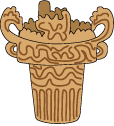 Ancient Japanese pottery. Many are attractively decorated. Ancient Japanese pottery. Many are attractively decorated. | |
| jôruri | 浄瑠璃 (kanji)pronunciation | The narrative ballad that is played with the music of the shamisen. | |
| jôshinko | 上新粉、上糝粉 (kanji, kanji)pronunciation | Powder from nonglutinous rice. | |
| joya no kane | 除夜の鐘 (kanji + hiragana + kanji)pronunciation | The bell of a temple sounded on the last day of the year. | |
| jûdô | 柔道 (kanji)pronunciation | Stylized competition of martial arts. | |
| jûji shuriken | 十字手裏剣 (kanji)pronunciation |  A throwing knife of the form of the cross. A throwing knife of the form of the cross. | |
| jûnishi | 十二支 (kanji)pronunciation | Twelve signs of the Oriental Zodiac. | |
| junmaishu | 純米酒 (kanji)pronunciation | Sake which was made with only rice and malted rice. | |
| K | kabayaki | 蒲焼き (kanji + hiragana)pronunciation | The fish which the body was opened and skewered it, and was grilled. Sweet sauce is attached to it. |
| kabuki | 歌舞伎 (kanji)pronunciation | The highly stylised classical Japanese dance-drama. | |
| kadô | 華道 (kanji)pronunciation | The Japanese art of flower arrangement. | |
| kagami-mochi | 鏡餅 (kanji)pronunciation | 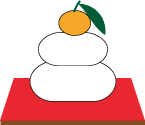 A rice cake piramid. A rice cake piramid. | |
| kagura | 神楽 (kanji)pronunciation | A Japanese word referring to a specific type of Shintô theatrical dance. | |
| kaijû | 怪獣 (kanji)pronunciation |  Monsters drawn in a Japanese drama. Monsters drawn in a Japanese drama. | |
| kairo | 懐炉、カイロ (kanji, katakana)pronunciation | A warmer of the pocket size. | |
| kaiseki | 懐石 (kanji)pronunciation | A traditional multi-course Japanese dinner. | |
| kaiten zushi | 回転寿司、回転ずし (kanji, kanji+ hiragana)pronunciation | Inexpensive sushi served on a conveyor belt. | |
| kaizen | 改善 (kanji)pronunciation | An action to reduce waste thoroughly. | |
| kakejiku | 掛け軸 (kanji+ hiragana + kanji)pronunciation | ||
| kaki | 柿 (kanji)pronunciation | Persimmon. | |
| kakiage | かき揚げ (hiragana + kanji + hiragana)pronunciation | The tempura which blended material of the inside. | |
| kakifurai | カキフライ (katakana)pronunciation | Meaning "fried oyster". | |
| kakigôri | かき氷 (hiragana + kanji)pronunciation | Shaved ice. | |
| kakimochi | かきもち (hiragana)pronunciation | Also known as arare or okaki. | |
| kakinotane | 柿の種 (kanji + hiragana + kanji)pronunciation | Arare resembled to a persimmon seed. | |
| kakipî | かきピー (hiragana + katakana)pronunciation |  Confectionary mixed kakinotanes with peanuts. Confectionary mixed kakinotanes with peanuts. | |
| kamaboko | 蒲鉾、かまぼこ (kanji,hiragana)pronunciation |  The food which processed the "surimi" of the white fish. The food which processed the "surimi" of the white fish. | |
| kamatoto | カマトト (katakana)pronunciation | Pretending to be innocent. | |
| kamikaze | 神風 (kanji)pronunciation | It means a suicide attack. | |
| kamishibai | 紙芝居 (kanji)pronunciation | The story that is provided to children by a picture and the talk. | |
| kanban | 看板 (kanji)pronunciation | The original meaning is outdoor advertising. It also means a thing guaranteeing social position. | |
| kanikama | カニかま (katakana + hiragana)pronunciation | A processed food in imitation of the meat of the crab. | |
| kanimiso | 蟹味噌 (kanji)pronunciation | Crab guts paste. | |
| kanji | 漢字 (kanji)pronunciation | The ideograph which is used in Japan and China. | |
| kanroni | 甘露煮 (kanji)pronunciation | Food stewed in soy sauce and sugar. | |
| Kansai ben | 関西弁 (kanji)pronunciation | Dialect of the Kansai area. | |
| kanten | 寒天 (kanji)pronunciation | Meaning "agar". A gelatinous substance derived from seaweed. | |
| kanzashi | かんざし、簪 (hiragana, kanji)pronunciation |  Hair ornaments used in traditional Japanese hairstyles. Hair ornaments used in traditional Japanese hairstyles. | |
| kappa | 河童、カッパ (kanji, katakana)pronunciation |  The monster who settles down in the river. The monster who settles down in the river. | |
| kappa maki | カッパ巻き (katakana + kanji + hiragana)pronunciation | A makizushi where a cucumber is in. | |
| karaage | 唐揚げ (kanji + hiragana)pronunciation | Deep-fried food without batter. | |
| karakusa moyô | 唐草模様 (kanji)pronunciation | Arabesque design. | |
| karaoke | カラオケ (katakana)pronunciation | The entertainment apparatus which adds accompaniment to a song. | |
| karashi | 辛子、からし (kanji, hiragana)pronunciation | A type of mustard used as a condiment or as a seasoning in Japanese cuisine. | |
| karate | 空手 (kanji)pronunciation | The Japanse martial art of unarmed self-defence. | |
| karintô | かりんとう (hiragana ,kanji)pronunciation |  Traditional Japanese snack food. Sweet and deep-fried, it is made primarily of flour, yeast, and brown sugar. Traditional Japanese snack food. Sweet and deep-fried, it is made primarily of flour, yeast, and brown sugar. | |
| karôshi | 過労死 (kanji)pronunciation | Meaning "overwork death”. | |
| karuta | カルタ (katakana)pronunciation | A Japanese card game. Referring to "iroha karuta". | |
| katori senkô | 蚊取り線香 (kanji + hiragana + kanji)pronunciation |  Incense used to repel mosquitos. Incense used to repel mosquitos. | |
| katsu | カツ (katakana)pronunciation | A deep-fried cutlet. | |
| katsubushiko | 鰹節粉 (kanji)pronunciation | Powder of katsuobushi. | |
| katsudon | カツ丼 (katakana + kanji)pronunciation | A bowl of rice topped with a deep-fried pork cutlet, egg, vegetables, and condiments. | |
| katsuobushi | 鰹節、かつおぶし (kanji, hiragana)pronunciation | The solid seasoning which is prepared the bonito into as raw materials. It is sharpened thinly and is used. It is the hardest food in the world. | |
| kawaî | 可愛い (kanji + hiragana)pronunciation | Meaning "cute", "pretty". | |
| kaya | 蚊帳 (kanji)pronunciation | A mosquito net. | |
| kayabuki | 茅葺き (kanji + hiragana)pronunciation | Thatching a roof with grass. | |
| kayari buta | 蚊遣り豚 (kanji + hiragana + kanji)pronunciation |  A figurine of pig to put a "katorisenko". A figurine of pig to put a "katorisenko". | |
| kayôkyoku | 歌謡曲 (kanji)pronunciation | One of the genres of popular music of Japan. | |
| kazunoko | 数の子 (kanji + hiragana + kanji)pronunciation | Herring roe. | |
| keiretsu | 系列 (kanji)pronunciation | A set of companies with interlocking business relationships and shareholdings. | |
| keirin | 競輪 (kanji)pronunciation | A track cycling event in which racing cyclists sprint for victory. | |
| kendô | 剣道 (kanji)pronunciation | A modern Japanese martial art of sword-fighting based on traditional Japanese swordsmanship, or Kenjutsu. | |
| kikizake | 利き酒 (kanji + hiragana + kanji)pronunciation | Judging the quality of sake from features including its fragrance, dryness and acidity. | |
| kiku | 菊 (kanji)pronunciation | Meaning "chrysanthemum". | |
| kimoi | キモい (katakana + hiragana)pronunciation | Creepy. Unsightly. | |
| kimono | 着物 (kanji)pronunciation | The national costume of Japan. Originally the word "kimono" literally meant "thing to wear". | |
| kinako | きなこ、黄な粉 (hiragana, kanji + hiragana + kanji) pronunciation | Soybean flour. | |
| kingyo | 金魚 (kanji)pronunciation | Meaning "goldfish". | |
| kingyo sukui | 金魚すくい (kanji + hiragana)pronunciation |  The goldfish scooping. The goldfish scooping. | |
| kintarô ame | 金太郎飴 (kanji)pronunciation | A candy cylindrical visible in the cross-sectional face of "Kintarô". | |
| kirigami | 切り紙 (kanji + katakana + kanji)pronunciation | Craft to shape by cutting the paper. | |
| kôban | 交番 (kanji)pronunciation | Japanese police box. | |
| kobucha | 昆布茶 (kanji)pronunciation | A beverage called tangle seaweed drink. | |
| kofun | 古墳 (kanji)pronunciation | Ancient king's tombs. tumulus. | |
| koharu biyori | 小春日和 (kanji)pronunciation | Indian Summer. | |
| koi | 鯉 (kanji)pronunciation |  Meaning "carp". Meaning "carp". | |
| koibana | 恋バナ (kanji + katakana)pronunciation | A confession about love. | |
| koi nobori | 鯉のぼり (kanji + hiragana)pronunciation |  Streamers in the shape of a carp. Streamers in the shape of a carp. | |
| kôji | 麹 (kanji)pronunciation | Microorganism (Mold) to make sake. | |
| kokeshi | こけし (hiragana)pronunciation |  Also called "Kokeshi dolls". Dolls made of wood. It has the shape of "i". Also called "Kokeshi dolls". Dolls made of wood. It has the shape of "i". | |
| kôkin | 抗菌 (kanji)pronunciation | Antibacterial. | |
| Kokkuri-san | コックリさん (katakana + hiragana)pronunciation | Table-turning game. | |
| komainu | 狛犬 (kanji)pronunciation |  Stone statue of the shrine. It is imitating a scary lion. Stone statue of the shrine. It is imitating a scary lion. | |
| kombu, konbu | 昆布 (kanji)pronunciation | Edible kelp. | |
| komike | コミケ (katakana)pronunciation | Abbreviation of comic market. Events that self-publication of the cartoon is sold. | |
| komishô | コミ障 (katakana + kanji)pronunciation | Communication disorder. | |
| komusô | 虚無僧 (kanji)pronunciation | A Japanese mendicant monk. | |
| konbini | コンビニ (katakana)pronunciation | Abbreviation of “Convenience store”. | |
| konnyaku | 蒟蒻、こんにゃく (kanji, hiragana)pronunciation | Devil's tongue yam. | |
| konnichiwa | こんにちは (hiragana)pronunciation | Meaning "Hello". | |
| kosupure (cosplay) | コスプレ (katakana)pronunciation | Performance that mimics the particular person. | |
| koto | 琴 (kanji)pronunciation | Musical instrument sounds when playing the chord. | |
| kotodama | 言霊 (kanji)pronunciation | The Japanese belief that mystical powers dwell in words and names. Meaning "Spirit of language". | |
| kukuri zaru | くくり猿 (hiragana + kanji)pronunciation |  An amulet dedicated to a shrine to make a wish come true. An amulet dedicated to a shrine to make a wish come true. | |
| kunai | くない (hiragana) | ||
| kunoichi | くノ一 (hiragana + katakana + kanji) |  Female "Ninja". Female "Ninja". | |
| kuro obi | 黒帯 (kanji)pronunciation | Black cloth belt. In a grade of the judo, the person who is higher than the first grade wears it. | |
| kushi katsu | 串カツ (kanji + katakana)pronunciation |  A deep-fried kabob. A skewer dish with bite-sized meats and vegetables on the skewer breaded with flour, eggs and bread crumbs, which is deep-fried. A deep-fried kabob. A skewer dish with bite-sized meats and vegetables on the skewer breaded with flour, eggs and bread crumbs, which is deep-fried. | |
| kusudama | くす玉 (hiragana + kanji)pronunciation | Decorative banner dropped from the ceiling. | |
| kuzumochi | 葛餅 (kanji)pronunciation | Sweets made of arrowroot starch and sweet red bean paste. | |
| kuzuyu | 葛湯、くず湯 (kanji, hiragana + kanji)pronunciation | A sweet Japanese beverage produced by adding kudzu flour to hot water. | |
| kwaidan, kaidan | 怪談 (kanji)pronunciation | Japanese ghost story or horror story. | |
| kyaraben, chara-ben | キャラ弁 (katakana + kanji)pronunciation |  A "bentô" that mimics the famous character. A "bentô" that mimics the famous character. | |
| kyôgen | 狂言 (kanji)pronunciation | The stage comedy traditional in Japan. | |
| kyûdou | 弓道 (kanji)pronunciation | Japanese-style archery as martial art. | |
| M | ma | 間 (kanji)pronunciation | Time blank that is essential to the entertainment and art. |
| machiya | 町家、町屋 (kanji, kanji)pronunciation | Traditional wooden townhouses found throughout Japan and typified in the historical capital of Kyoto. | |
| maid cafe, meido kafe | メードカフェ (katakana)pronunciation | Coffee shop that clerks are wearing the uniform of maid. | |
| maiko | 舞妓 (kanji)pronunciation | Traditional dancing girls who entertain guest at Japanese-style banquets. | |
| makizushi | 巻き寿司 (kanji + hiragana + kanji)pronunciation | Sushi wrapped in seaweed paper. | |
| mamachari | ママチャリ (katakana)pronunciation | Meaning "city cycle". A bicycle that young mothers mainly ride. | |
| mamedanuki, mameda, mameta | 豆狸 (kanji)pronunciation | 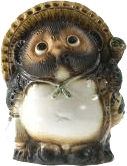 An ornament that mimics the specter of raccoon dog. An ornament that mimics the specter of raccoon dog. | |
| manekineko | 招き猫 (kanji + hiragana + kanji)pronunciation |  Cat-shaped ornament to beckon good luck. Cat-shaped ornament to beckon good luck. | |
| manga | 漫画、マンガ (kanji, katakana)pronunciation | Comics and print cartoons. | |
| manjû | まんじゅう、饅頭 (hiragana, kanji)pronunciation | A traditional confection that made from flour, rice powder and buckwheat and a filling of red bean paste, made from boiled azuki beans and sugar. | |
| manzai | 漫才 (kanji)pronunciation | A traditional style of stand-up comedy in Japanese culture, which usually involves two performers. | |
| manzaishi | 漫才師 (kanji)pronunciation | Manzai performers. | |
| masu | 升 (kanji)pronunciation | A wooden square box for measuring the grain. | |
| matcha, maccha | 抹茶 (kanji)pronunciation | Tea powder. Drink by pouring hot water. | |
| matsutake | マツタケ、松茸 (katakana, kanji)pronunciation | 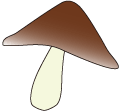 A kind of mushroom. King of mushroom in Japan. A kind of mushroom. King of mushroom in Japan. | |
| mayoke | 魔除け (kanji + hiragana)pronunciation |  Talisman against evil. Talisman against evil. | |
| medamayaki | 目玉焼き (kanji + hiragana)pronunciation | Two eggs sunny‐side up. | |
| melonpan | メロンパン (katakana)pronunciation |  Japanese sweet bun. There are multiple types, and the definition is not fixed Japanese sweet bun. There are multiple types, and the definition is not fixed | |
| mentaiko | 明太子 (kanji)pronunciation | ||
| mezashi | メザシ (katakana)pronunciation | 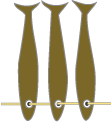 Meaning "dried sardines". Meaning "dried sardines". | |
| mikado | 帝 (kanji)pronunciation | Emperor of Japan. | |
| miko | 巫女 (kanji)pronunciation | Women to serve God at the shrine. | |
| mikoshi | みこし、神輿 (hiragana,kanji)pronunciation | Shrine of the mobile to be used in the parade. | |
| minazuki | 水無月 (kanji)pronunciation | Sweets made of arrowroot starch, red bean paste and rice flour. | |
| min'yô | 民謡 (kanji)pronunciation | Japanese folk ballad. | |
| mirin | みりん、味醂 (hiragana,kanji)pronunciation | An essential condiment used in Japanese cuisine, consisting of 50% sugar. | |
| miso | みそ、味噌 (hiragana,kanji)pronunciation | Fermented food made from soybean, kôji and salt. | |
| miso soup, misoshiru | みそ汁、味噌汁 (hiragana + kanji,kanji)pronunciation | Meaning "Miso soup". A Japanese culinary staple. | |
| mitarashi dango | みたらし団子 (hiragana + kanji)pronunciation | ||
| mitsumame | みつまめ (hiragana)pronunciation | Sweet confectionery fruit and agar jelly entered. | |
| miyabi | 雅 (kanji)pronunciation | The traditional Japanese aesthetic ideals. | |
| mochi | 餅、モチ (kanji, katakana)pronunciation | A Japanese rice cake made of glutinous rice. | |
| mochiko | もち粉 (hiragana + kanji)pronunciation | Rice flour (also rice powder). | |
| moe | 萌え (kanji + hiragana)pronunciation | Strong attachment to Characters. | |
| mokugyo | 木魚 (kanji)pronunciation |  A fish-shaped wooden drum. Wooden gong. A fish-shaped wooden drum. Wooden gong. | |
| momiji | 紅葉 (kanji)pronunciation | Maple leaf that is browned red in fall. | |
| monaka | 最中、モナカ (kanji, katakana)pronunciation | A kind of sweets. Bean paste is in the inside of the wafer. | |
| mono no aware | もののあはれ (hiragana)pronunciation | A Japanese term for the awareness of impermanence (mujou), or transience of things, and a gentle sadness (or wistfulness) at their passing. | |
| mononke | 物の怪 (kanji + hiragana + kanji)pronunciation | Evil spirits. | |
| motsu yaki | モツ焼き (katakana + kanji + hiragana)pronunciation | Roast giblet. | |
| mottainai | もったいない、勿体ない (hiragana, kanji + hiragana)pronunciation | Feeling reluctant that goods and people are not valued. | |
| mozuku | もずく (hiragana)pronunciation | A kind of edible seaweed. | |
| mugicha | 麦茶 (kanji)pronunciation | Meaning "roasted barley tea". | |
| mugikogashi | 麦こがし (kanji + hiragana)pronunciation | A flour made by parching and then grinding barley. Also called "hattaiko". | |
| N | nabemono | 鍋物 (kanji)pronunciation | Generic name of the dish using pot. |
| nagashibina | 流し雛 (kanji + hiragana + kanji)pronunciation |  Paper dolls floated downriver on March 3rd. Paper dolls floated downriver on March 3rd. | |
| nagashi sômen | 流しそうめん (kanji + hiragana)pronunciation | Noodles that are poured into a gutter with water and eaten with chopsticks. | |
| naginata | なぎなた、長刀 (hiragana, kanji)pronunciation | Single-edged spear. | |
| nagomu | 和む (kanji + hiragana)pronunciation | Feel completely peaceful. | |
| namahage | なまはげ (hiragana)pronunciation |  A demonlike being, portrayed by men wearing oversized ogre masks and traditional straw capes. A demonlike being, portrayed by men wearing oversized ogre masks and traditional straw capes. | |
| namazake | 生酒 (kanji)pronunciation | Unpasteurized sake. | |
| nameko | なめこ (hiragana)pronunciation | A small, amber-brown mushroom. | |
| naniwabushi | 浪花節 (kanji)pronunciation | Entertainment to tell the story to the shamisen accompaniment. Also called "rôkyoku". | |
| narutomaki | 鳴戸巻き (kanji + hiragana)pronunciation |  Kamaboko (steamed fish-paste) with a whirlpool pattern. Kamaboko (steamed fish-paste) with a whirlpool pattern. | |
| nattô | 納豆 (kanji)pronunciation | Fermented soybeans. | |
| neaka | ネアカ (katakana)pronunciation | Cheerful personality. | |
| negima | ねぎま (kanji)pronunciation | Dish of tuna and onion served hot in a pot. | |
| nekama | ネカマ (katakana)pronunciation | A man posing as a woman on the net. | |
| neko cafe | 猫カフェ (kanji + katakana)pronunciation | The coffee shop which enjoys the contact with the cat. | |
| nekura | ネクラ (katakana)pronunciation | Dismal guy personality. | |
| nemawashi | 根回し (kanji + hiragana)pronunciation | Pre-conditioning. | |
| nenbutsu, nembutsu | 念仏 (kanji)pronunciation | A term commonly seen in the Pure Land school of Mahayana Buddhism. | |
| nerikarashi | 練りからし (kanji + hiragana)pronunciation | Mustard paste. | |
| nerikomi | 練り込み (kanji + hiragana + kanji + hiragana) pronunciation | A kind of pottery technique in Japan. | |
| neta | ネタ (katakana)pronunciation | A small episode that produce laughter. | |
| netsuke | 根付 (kanji)pronunciation |  Miniature sculptures that were invented in 17th-century Japan to serve a practical function. Miniature sculptures that were invented in 17th-century Japan to serve a practical function. | |
| niboshi | 煮干し (kanji + hiragana)pronunciation | Dried baby sardines. It is used as a soup seasoning. | |
| nigiri meshi | 握り飯 (kanji + hiragana + kanji)pronunciation | Also known as onigiri (omusubi, rice balls). | |
| Nihon | 日本 (kanji)pronunciation | Japan. Also called "Nippon". | |
| Nihon buyô | 日本舞踊、日舞 (kanji, kanji)pronunciation | Japanes-style dances. Also called "nichibu". | |
| nihonga | 日本画 (kanji)pronunciation | Paintings that have been made in accordance with traditional Japanese artistic conventions, techniques and materials. | |
| nihongami | 日本髪 (kanji)pronunciation | Hair style of old Japanese woman. | |
| nihongo | 日本語 (kanji)pronunciation | Japanese language. | |
| nihonshoku | 日本食 (kanji)pronunciation | Japanese traditional meal. An example: Sushii, tempura. Also known as "washoku". | |
| nihonshu | 日本酒 (kanji)pronunciation | An alcoholic beverage of Japanese origin that is made from fermented rice. Also known as sake. | |
| Nihon teien | 日本庭園 (kanji)pronunciation | Japanes-style gardens. | |
| nihontô | 日本刀 (kanji)pronunciation |  Japanese sword Japanese sword | |
| nikujaga | 肉じゃが (kanji + hiragana)pronunciation | Japanese cuisine with stewed meat, potatoes, thread konjac, etc. | |
| ningyô jôruri | 人形浄瑠璃 (kanji)pronunciation | Japanese puppet theatre in which recited narrative and dialog is accompanied by a shamisen. Also known as "bunraku". | |
| ninja | 忍者 (kanji)pronunciation | A warrior specially trained in a variety of unorthodox arts of war. | |
| ninjutsu | 忍術 (kanji)pronunciation | Combat surgery unorthodox manner by ninja. | |
| nishikigoi | 錦鯉 (kanji)pronunciation | Ornamental varieties of carp. | |
| noh, nô | 能 (kanji)pronunciation | A kind of classic stage drama that played it with a mask. | |
| nohmen, nômen | 能面 (kanji)pronunciation | Mask used in a Noh play. | |
| nonke | ノン気 (katakana + kanji)pronunciation | Heterosexual, a straight person. | |
| noren | 暖簾、のれん (kanji, hiragana)pronunciation |  Posters made of cloth that is Hanging in front of the store. Posters made of cloth that is Hanging in front of the store. | |
| nori | 海苔、ノリ (kanji,katakana)pronunciation | Edible seaweed that is processed into a sheet. | |
| norimaki | 海苔巻き (kanji + hiragana)pronunciation | Sushi wrapped in seaweed. | |
| noritsuki fusen | 糊つき付箋、ノリつきふせん (kanji + hiragana + kanji, katakana + hiragana) pronunciation |  Sticky note with a glue on the back. Also called "Post-it". Sticky note with a glue on the back. Also called "Post-it". | |
| noroi no wara ningyô | 呪いの藁人形 (kanji + hiragana + kanji)pronunciation |  Jack of straw of the spell. Jack of straw of the spell. | |
| nyotaimori | 女体盛り (kanji + hiragana)pronunciation | The practice of serving sashimi or sushi from the body of a woman, typically naked. It is not Japanese manners and customs. | |
| O | ochazuke | お茶漬け (hiragana + kanji + hiragana)pronunciation | Simple dishes just put the tea and seasoning to rice. |
| oden | おでん (hiragana)pronunciation | 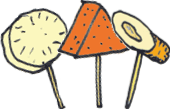 Cooking stewed various food. Cooking stewed various food. | |
| ôgi | 扇 (kanji)pronunciation | 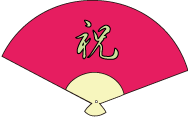 A handy fan. Also known as "sensu". A handy fan. Also known as "sensu". | |
| ohagi | おはぎ (hiragana)pronunciation | A springtime treat made with rice and sweet red bean paste. Also known as "botamochi". | |
| ohayô | おはよう、お早う (hiragana, hiragana + kanji + hiragana) pronunciation | Good Morning. | |
| oiran | 花魁 (kanji)pronunciation | 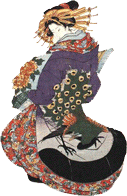 Meaning courtesans in a flashy costume. Meaning courtesans in a flashy costume. | |
| okaki | おかき (hiragana)pronunciation | Baked rice cake. Also known as "kakimochi". | |
| okama | おかま (hiragana)pronunciation | Gay in Japan. | |
| okara | おから (hiragana)pronunciation | Dregs that made tôfu from soy. | |
| okayu | おかゆ (hiragana)pronunciation | Rice porridge. | |
| okonomiyaki | お好み焼き (hiragana + kanji + hiragana + kanji + hiragana) pronunciation | Pancakes put plenty of meat and vegetables. | |
| omamori | お守り (hiragana + kanji + hiragana)pronunciation |  Japanese amulets (charms, talismans) commonly sold at religious sites. Japanese amulets (charms, talismans) commonly sold at religious sites. | |
| omikuji | おみくじ (hiragana)pronunciation | Random fortunes written on strips of paper at Shintô shrines and Buddhist temples in Japan. | |
| omotenashi | おもてなし (hiragana)pronunciation | The spirit of hospitality. | |
| omu-rice | オムライス (katakana)pronunciation | An example of contemporary Japanese cuisine consisting of an omelette made with fried rice and usually topped with ketchup. | |
| oni | 鬼 (kanji)pronunciation | Creatures from Japanese folklore, variously translated as demons, devils, ogres or trolls. | |
| onigiri (nigiri meshi) | おにぎり (hiragana)pronunciation |  A food made from white rice formed into triangular or oval shape and often wrapped in nori (edible "seaweed"). also known as omusubi or rice ball. A food made from white rice formed into triangular or oval shape and often wrapped in nori (edible "seaweed"). also known as omusubi or rice ball. | |
| onmyôji | 陰陽師 (kanji)pronunciation | One of the classifications of civil servants belonging to the Bureau of Onmyô in ancient Japan's ritsuryô system. People with this title were professional practitioners of onmyodo. | |
| onsen | 温泉 (kanji)pronunciation | Bathhouse facility using the hot water springs from the ground. A hot spring. A spa. | |
| origami | 折り紙 (kanji + hiragana + kanji)pronunciation |  Crafts made by folding the paper. Crafts made by folding the paper. | |
| osechi | おせち (hiragana)pronunciation | 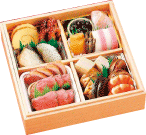 New year's feast. New year's feast. | |
| osonae | お供え (hiragana + kanji + hiragana)pronunciation | Foods and drinks to be provided to the God or Buddha. | |
| ossu | 押忍、オッス (kanji, katakana)pronunciation | Greeting used between close male friends. | |
| otaku | オタク (katakana)pronunciation | People who indulge in a particular object each. Meaning "nerds". | |
| otohime | 音姫 (kanji)pronunciation | Melody or flushing sound played by a Japanese toilet to mask excretion sounds. | |
| otokomae | 男前 (kanji)pronunciation | Meaning "Handsome man". | |
| otoshidama | お年玉 (hiragana + kanji)pronunciation | New Year's manetary gift that presented to children. | |
| oyaji gag | 親父ギャグ (kanji + katakana)pronunciation | Silly sllier silliest gag. | |
| oyako donburi | 親子丼 (kanji)pronunciation | Bowl dish topped with chicken and eggs. | |
| oyama | 女形 (kanji)pronunciation | Male actor who plays the role of women. | |
| oyatsu | おやつ (hiragana)pronunciation | An afternoon snack. | |
| P | pachinko | パチンコ (katakana)pronunciation | A Japanese gaming device. Japanese pinball games. It is available in specialty stores. |
| panko | パン粉 (katakana + kanji)pronunciation | Things like breadcrumbs. | |
| pasokon | パソコン (katakana)pronunciation | Meaning "PC". | |
| pongashi | ポン菓子 (katakana + kanji)pronunciation | Confectionery inflated rice. | |
| ponzu | ポン酢 (katakana + kanji)pronunciation | A citrus-based sauce commonly used in Japanese cuisine. | |
| purikura | プリクラ (katakana)pronunciation | The machine that print your portrait photo on Sealed paper. Print Club. | |
| R | rakkyô | 辣韮、らっきょう (kanji, hiragana)pronunciation | A kind of allium. Shallot bulbs. |
| rakugo | 落語 (kanji)pronunciation | Verbal entertainment in Japan. It is played by a entertainer who sit on the cushion. | |
| rakugoka | 落語家 (kanji)pronunciation |  Rakugo storyteller. Also known as "hanashika". Rakugo storyteller. Also known as "hanashika". | |
| renkon | レンコン、蓮根 (katakana, kanji)pronunciation | Meaning "lotus root". | |
| renku | 連句 (kanji)pronunciation | Relay event of haiku. | |
| rikishi | 力士 (kanji)pronunciation | Sumô wrestler. | |
| roji | 露地、路地 (kanji, kanji)pronunciation | An alley. A blind alley. Also called "rôji". | |
| rôkyoku | 浪曲 (kanji)pronunciation | Narrative telling story on stage accompanied by a shamisen player. Also called "naniwabushi". | |
| rotenburo | 露天風呂 (kanji)pronunciation | Meaning "outdoor baths". | |
| S | sabazushi | サバ寿司 (katakana + kanji)pronunciation | A pressed sushi that topped vinegared mackerel slices. |
| sadô | 茶道 (kanji)pronunciation | Ceremony to enjoy the tea. Also called "chanoyu". | |
| saisen bako | 賽銭箱 (kanji)pronunciation |  Box to put the price of the wish of God. It has been placed in the shrine. Box to put the price of the wish of God. It has been placed in the shrine. | |
| sake | 酒 (kanji)pronunciation | The name for this specific Japanese beverage made from rice. | |
| sakura | 桜 (kanji)pronunciation | Cherry blossoms or cherry trees. | |
| sakura fubuki | 桜吹雪 (kanji)pronunciation | Blizzard of falling cherry blossoms. | |
| sakuramochi | 桜餅 (kanji)pronunciation |  Bean paste rice-cake wrapped in a cherry leaf. Bean paste rice-cake wrapped in a cherry leaf. | |
| samurai | 侍、サムライ (kanji, katakana)pronunciation | Japanese knight. | |
| sandô | 参道 (kanji)pronunciation | An approach to a shrine. | |
| sangaku | 算額 (kanji)pronunciation | A ema that wrote mathematical solutions and problems. | |
| sansho | 山椒 (kanji)pronunciation | Japanese pepper. | |
| sarakin | サラ金 (katakana + kanji)pronunciation | Meaning usury. | |
| sashimi | 刺身 (kanji)pronunciation | A Japanese foods consisting of fresh raw seafood. | |
| satori | 悟り (kanji + hiragana)pronunciation | A Japanese Buddhist term for awakening, "comprehension; understanding". | |
| satsumaage | さつま揚げ (kanji + hiragana)pronunciation | Deep‐fried minced fish and vegetables. | |
| sayonara | さよなら (hiragana)pronunciation | Meaning "goodbye". | |
| sekihan | 赤飯 (kanji)pronunciation | Rice dyed red with red beans. | |
| sekuhara | セクハラ (katakana)pronunciation | Abbreviation of sexual harassment. | |
| sembei | 煎餅 (kanji)pronunciation |  Japanese crackers, made from rice. Japanese crackers, made from rice. | |
| sembazuru | 千羽鶴 (kanji)pronunciation | Thousand origami cranes. A group of one thousand origami paper cranes held together by strings. | |
| sempai | 先輩 (kanji)pronunciation | People who first entered group or organization. | |
| sencha | 煎茶 (kanji)pronunciation | Japanese green tea. | |
| sengiri daikon | 千切り大根 (kanji + hiragana + kanji)pronunciation | Julienne Japanese radish. | |
| senja fuda | 千社札 (kanji)pronunciation |  Stickers or scraps of paper posted on the gates of shrines and Buddhist temples in Japan. Stickers or scraps of paper posted on the gates of shrines and Buddhist temples in Japan. | |
| senryû | 川柳 (kanji)pronunciation | A Japanese form of short poetry similar to haiku. | |
| sensu | 扇子 (kanji + hiragana)pronunciation | The fan folding portable. | |
| sentô | 銭湯 (kanji)pronunciation | Baths facility of pay. | |
| seppuku | 切腹 (kanji)pronunciation | Disembowelment. Also called "harakiri". | |
| setsuden | 節電 (kanji)pronunciation | Saving of electricity. | |
| setta | 雪駄 (kanji)pronunciation |  Leather-soled geta. Leather-soled geta. | |
| shabushabu | しゃぶしゃぶ (hiragana)pronunciation | A Japanese nabemono hotpot dish of thinly sliced meat and vegetables boiled in water. | |
| shachihoko | 鯱、しゃちほこ (kanji, hiragana)pronunciation |  Object of a good luck charm that has been installed on the roof of the donjon. Object of a good luck charm that has been installed on the roof of the donjon. | |
| shakuhachi | 尺八 (kanji)pronunciation | Whistle bamboo. | |
| sha-mail | 写メール (kanji + katakana)pronunciation | Photograph to send with a cell-phone. | |
| shamisen | 三味線 (kanji)pronunciation |  A three-stringed musical instrument. A three-stringed musical instrument. | |
| shiatsu | 指圧 (kanji)pronunciation | Massage technique to push body with fingers. | |
| shibainu | 柴犬 (kanji)pronunciation | Typical Japanese dog. | |
| Shichifukujin | 七福神 (kanji)pronunciation | The Seven Gods which bring the good luck. | |
| shichimi tôgarashi | 七味唐辛子 (kanji)pronunciation | Seven flavor chili pepper. A common Japanese spice mixture containing seven ingredients. | |
| shikki | 漆器 (kanji)pronunciation | Meaning "Japan lacquerware". | |
| shikoku hachijûhakkasho reijô meguri | 四国八十八箇所霊場廻り (kanji + hiragana)pronunciation | Visiting eighty-eight holy places in Shikoku sacred place. | |
| shimekazari | 注連飾り、しめ飾り (kanji + hiragana, hiragana + kanji + hiragana) pronunciation |  Decorated sacred straw festoon. Decorated sacred straw festoon. | |
| shimenawa | 注連縄、しめ縄 (kanji, hiragana + kanji)pronunciation | Thick rope in the shrine. | |
| shinai | 竹刀 (kanji)pronunciation | Wooden sword to be used in "Kendô". | |
| shintô | 神道 (kanji)pronunciation | The native religion of Japan. | |
| shirasuboshi | しらす干し (hiragana + kanji + hiragana)pronunciation | Boiled and dried young anchovies. | |
| shiratamako | 白玉粉 (kanji)pronunciation | Rice flour for dumplings. | |
| shiruko | 汁粉 (kanji)pronunciation | Sweet red‐bean soup with rice cake. | |
| shîsâ | シーサー (katakana)pronunciation | Amulets in the shape of the beast. | |
| shishimai | 獅子舞 (kanji)pronunciation |  Entertainment of the New Year. Dance in cosplay of Lion. Entertainment of the New Year. Dance in cosplay of Lion. | |
| shishiodoshi | ししおどし、鹿威し (hiragana, kanji + hiragana)pronunciation |  Generate sounds by using the water current. Generate sounds by using the water current. | |
| shiso | シソ、紫蘇 (katakana, kanji)pronunciation | Asian culinary herb, seed (spice). | |
| shîtake | シイタケ、椎茸 (katakana, kanji)pronunciation | A kind of edible mushroom. It has been cultivated in East Asia. | |
| sho | 書 (kanji)pronunciation | Japanese calligraphy. | |
| shô | 笙 (kanji)pronunciation | A Japanese reed musical instrument. | |
| shôchû | 焼酎 (kanji)pronunciation | One of the spirits of Japan. | |
| shodô | 書道 (kanji)pronunciation | Art of Japanese calligraphy. | |
| shôene | 省エネ (kanji + katakana)pronunciation | Reduction of energy consumption. | |
| shôga | 生姜 (kanji)pronunciation | Meaning "Ginger". | |
| shôgi | 将棋 (kanji)pronunciation | A two-player board game. The game uses Small pieces of wood of the pentagon. | |
| shôgun | 将軍 (kanji)pronunciation | Commander in chief of the Japanese army. | |
| shôji | 障子 (kanji)pronunciation | One of the door of Japan. It is affixed thin paper to wooden frame. | |
| shôka | 唱歌 (kanji)pronunciation | Songs that was published on the assumption that children are taught in schools. | |
| shokugan | 食玩 (kanji)pronunciation | Toys associated with foods. | |
| shôyu | 醤油 (kanji)pronunciation | Meaning "soy sauce". | |
| shôyudai | 醤油鯛 (kanji)pronunciation |  The soy sauce case which modelled a sea bream. The soy sauce case which modelled a sea bream. | |
| shuriken | 手裏剣 (kanji)pronunciation | ||
| soba | 蕎麦、ソバ (kanji, katakana)pronunciation | A type of thin Japanese noodle made from buckwheat flour. | |
| sômen | 素麺、そうめん (kanji, hiragana)pronunciation | Thin "udon". | |
| sonzaikan | 存在感 (kanji)pronunciation | People and things that certainly make you feel that you are there. | |
| soroban | 算盤、そろばん (kanji, hiragana)pronunciation | Tools for calculating. | |
| sôzai | 惣菜 (kanji)pronunciation | Side dishes that are issued to the meal time of day-to-day. | |
| subuta | 酢豚 (kanji)pronunciation | Sweet and sour pork cuisine. | |
| sudare | すだれ、簾 (hiragana, kanji)pronunciation | Japanese screens or blinds. | |
| sûdoku | 数独 (kanji)pronunciation | A logic-based number-placement puzzle. | |
| suiseki | 水石 (kanji)pronunciation |  Art of finding beauty in natural stone. Art of finding beauty in natural stone. | |
| sukiyaki | すき焼き、スキヤキ (hiragana + kanji + hiragana.katakana) pronunciation | Food was Braised beef and vegetables. | |
| sumô | 相撲 (kanji)pronunciation | Japanese-style wrestling. Fat man of the two men fight In the round ring. | |
| surimi | すり身 (hiragana + kanji)pronunciation | Fish that be crushed into a paste. | |
| surume | スルメ (katakana)pronunciation |  Dried shredded squid. Dried shredded squid. | |
| sushi | 寿司、鮨、スシ (kanji, kanji, katakana) pronunciation | Food which is a combination of raw seafood in vinegar rice. | |
| T | tabi | 足袋 (kanji)pronunciation | Traditional Japanese socks. |
| taiyaki | タイ焼き (katakana + kanji + hiragana)pronunciation |  A Japanese fish-shaped cake. The common filling is red bean paste. A Japanese fish-shaped cake. The common filling is red bean paste. | |
| Taiyô no tô | 太陽の塔 (kanji + hiragana + kanji)pronunciation |  The huge monument which Taro Okamoto designed it, and was built in the Osaka World Exposition meeting place. The huge monument which Taro Okamoto designed it, and was built in the Osaka World Exposition meeting place. | |
| Takarazienne | タカラジェンヌ (katakana)pronunciation | Women devoted to Takarazuka actress. | |
| takenoko | タケノコ、筍 (katakana, kanji)pronunciation | Young bamboo, which is edible. | |
| takoyaki | たこ焼き (hiragana + kanji + hiragana)pronunciation |  Food of spherical octopus is on. Food of spherical octopus is on. | |
| tanabata | 七夕 (kanji)pronunciation | The Star Festival held on July 7. Children make a wish for the stars. | |
| tanka | 短歌 (kanji)pronunciation | A classical Japanese verse form. Also known as waka. | |
| tanuki | 狸、タヌキ (kanji, katakana)pronunciation |  Meaning "racoon dog". It is funky character. Meaning "racoon dog". It is funky character. | |
| tarako | タラコ、鱈子 (katakana, kanji)pronunciation | A salted roe food. | |
| tare | タレ (katakana)pronunciation | Seasoning soy. | |
| tatami | 畳 (kanji)pronunciation | A traditional type of Japanese flooring. | |
| tecchiri | てっちり (hiragana)pronunciation | A type of Japanese dish consisting of globefish boiled in a pot. | |
| teishoku | 定食 (kanji)pronunciation | Cooking course off-the-shelf. | |
| tekkamaki | 鉄火巻き (kanji + hiragana)pronunciation | Vinegared rice rolled around a slice of tuna and covered with dried seaweed. | |
| tempura | 天ぷら、天婦羅、テンプラ (kanji + hiragana, kanji, katakana) pronunciation | 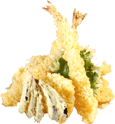 Cooking fried it with a flour kneaded. Cooking fried it with a flour kneaded. | |
| tendon | 天丼 (kanji)pronunciation | Tempura bowl. | |
| tengu | 天狗 (kanji)pronunciation | Long nose monster that is face red. | |
| tennen | 天然 (kanji)pronunciation | The natural character that became blockhead. | |
| tennô | 天皇 (kanji)pronunciation | The symbolic king of Japan. He does not maintain political power. | |
| tenshukaku | 天守閣 (kanji)pronunciation | Meaning "donjon". | |
| teppanyaki | 鉄板焼き (kanji + hiragana)pronunciation | A style of Japanese cuisine that uses an griddle to cook food. | |
| teriyaki | 照り焼き (kanji + hiragana + kanji + hiragana) pronunciation | Foods baked while applying sauce. | |
| tobidashi-kun | 飛び出し君 (kanji + hiragana + kanji + hiragana+ kanji) pronunciation |  A signboard that asks the driver of the car to watch out for children walking. A signboard that asks the driver of the car to watch out for children walking. | |
| tôfu | 豆腐 (kanji)pronunciation | A food made by coagulating soy milk, and then pressing the resulting curds into blocks. | |
| tôji | 杜氏 (kanji)pronunciation | A sake brew-master. | |
| tokkô | 特攻 (kanji)pronunciation | A military unit known for conducting kamikaze attacks. | |
| tokoroten | 心太、ところてん (kanji, hiragana)pronunciation | A dish in Japanese cuisine made from agar substance extracted from seaweeds by boiling. | |
| tondemo | トンデモ (katakana)pronunciation | Meaning outrageous. | |
| tonjiru | 豚汁 (kanji)pronunciation | Japanese cuisine with stewed pork and vegetables. Also called 'butajiru'. | |
| tonkatsu | 豚カツ、トンカツ (kanji + katakana, katakana)pronunciation | A Cutlet of pork. | |
| tonkotsu | 豚骨、とんこつ (kanji, hiragana)pronunciation | Bone of pig to be used in the soup. | |
| torî | 鳥居 (kanji)pronunciation |  A gate of the shrine. A gate of the shrine. | |
| toro | トロ (katakana)pronunciation | Fatty tuna meat. | |
| tôrô | 燈籠、灯籠 (kanji, kanji)pronunciation | A traditional lantern made of stone or wood. | |
| tôrô nagashi | 灯籠流し (kanji + hiragana)pronunciation | Ritual put a paper lantern on the river. | |
| tororo | とろろ (hiragana)pronunciation | Grated yam. | |
| tsukemen | つけ麺 (hiragana + kanji)pronunciation | Generic term for noodles to eat by immersion in liquid seasoning. | |
| tsukemono | 漬け物、漬物 (kanji + hiragana + kanji, kanji)pronunciation | Pickled Vegetables. | |
| tsukimi | 月見 (kanji)pronunciation | Japanese festivals honoring the autumn moon. | |
| tsukimi dango | 月見団子 (kanji)pronunciation | 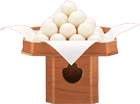 Dumplings offered to the moon. Dumplings offered to the moon. | |
| tsukkomi | ツッコミ (katakana)pronunciation | Sharp teasing for words blurred. | |
| tsukudani | 佃煮 (kanji)pronunciation | Small seafood that has been simmered in soy sauce and mirin. | |
| tsukumogami | 九十九神 (kanji)pronunciation | Monsters of an old miscellaneous goods. | |
| tsukune | つくね (hiragana)pronunciation | Dumpling of rounding to knead the meat. | |
| tsukushi | つくし、土筆 (hiragana, kanji)pronunciation | ||
| tsunami | 津波 (kanji)pronunciation | Big waves that attacked from the sea. | |
| tsurishinobu | つりしのぶ、釣り忍 (hiragana, kanji + hiragana + kanji)pronunciation | 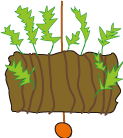 A decorative item in which a fern rhizome is wrapped around a bamboo core and hung. The spherical one is called 'shinobudama'. A decorative item in which a fern rhizome is wrapped around a bamboo core and hung. The spherical one is called 'shinobudama'. | |
| U | uchiwa | 団扇、うちわ (kanji, hiragana)pronunciation | 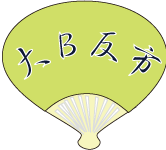 Meaning "Handy fan". Meaning "Handy fan". |
| udo | 独活、うど (kanji, hiragana)pronunciation | Aralia cordata. A Japanese celery. | |
| udon | 饂飩、うどん (kanji, hiragana)pronunciation | A type of thick wheat-flour noodle popular in Japanese cuisine. | |
| uirô | ういろう、外郎 (hiragana, kanji)pronunciation | Steamed cake using rice flour. | |
| uukiyoe | 浮世絵 (kanji)pronunciation | A woodblock print of Edo period. | |
| umami | 旨味 (kanji)pronunciation | One of the five basic tastes sensed by specialized receptor cells present on the human tongue. | |
| ume | 梅 (kanji)pronunciation | Japanese apricot (plum) tree. | |
| umeboshi | 梅干し (kanji + hiragana)pronunciation | Pickled ume. | |
| umeshu | 梅酒 (kanji)pronunciation | A Japanese liqueur made from steeping ume in alcohol and sugar. | |
| uni | 雲丹、ウニ (kanji, katakana)pronunciation | Sea urchins. Sea chestnuts. Salted ovary of sea urchin is a delicious food. | |
| urushi | 漆 (kanji)pronunciation | Meaning "japan lacquer". It is used as a paint for crafts. | |
| uzai | うざい (hiragana)pronunciation | An appearance is cheerless. | |
| W | wabisabi | わびさび (hiragana)pronunciation | A comprehensive Japanese world view or aesthetic centered on the acceptance of transience and imperfection. |
| wadaiko | 和太鼓 (kanji)pronunciation |  A Japanese drum. A Japanese drum. | |
| wafuku | 和服 (kanji)pronunciation | The traditional Japanese clothing. Kimonos. | |
| wagashi | 和菓子 (kanji)pronunciation | 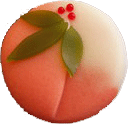 A traditional Japanese confectionery. A traditional Japanese confectionery. | |
| waka | 和歌 (kanji)pronunciation | A classical Japanese verse form and one of the major genres of Japanese literature. Tanka. | |
| wakame | 若布、ワカメ (kanji, katakana)pronunciation | A type of edible kelp. | |
| warabeuta | 童歌、わらべ歌 (kanji, hiragana + kanji)pronunciation | Traditional Japanese songs, similar to nursery rhymes. They are often sung as part of traditional children's games. | |
| warabi | わらび、蕨 (hiragana, kanji)pronunciation | Bracken (Pteridium). | |
| warabi mochi | わらび餅 (hiragana + kanji, kanji)pronunciation | A jelly-like confection made from bracken starch. | |
| waraji | 草鞋、わらじ (kanji, hiragana)pronunciation | Sandals made of straw rope. | |
| waribashi | 割り箸 (kanji + kanji + hiragana)pronunciation | 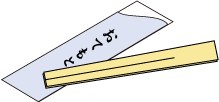 Splittable chopsticks. Disposable chopsticks. Splittable chopsticks. Disposable chopsticks. | |
| warikan | 割り勘 (kanji + hiragana + kanji)pronunciation | Dutch treat. Equal split. | |
| wasabi | 山葵、わさび (kanji,hiragana)pronunciation | Japanese horseradish. | |
| wasan | 和算 (kanji)pronunciation | Mathematics that evolved independently in Japan. | |
| washi | 和紙 (kanji)pronunciation | The paper of Japan by traditional manufacturing methods. | |
| washoku | 和食 (kanji)pronunciation | Japanese traditional meal. An example: Soba, sashimi. | |
| Y | yabusame | 流鏑馬 (kanji)pronunciation | Horseback archery. |
| yakiimo | 焼き芋 (kanji + hiragana + kanji)pronunciation | A baked sweet potato. | |
| yakitori | 焼き鳥 (kanji + hiragana + kanji)pronunciation | A Japanese type of skewered chicken. Barbecued chicken. | |
| yakuza | やくざ、ヤクザ (hiragana,katakana)pronunciation | Members of traditional organized crime groups in Japan, and also known as the "violence group". | |
| yatai | 屋台 (kanji)pronunciation | A portable stall. | |
| yamaboko | 山鉾 (kanji)pronunciation | The decorated wooden cars. They march in the Gion Festival. | |
| yamato-damashii | 大和魂 (kanji)pronunciation | Guts of Japanese. | |
| yaoi | やおい (hiragana)pronunciation | A popular term for fictional media that focuses on homosexual male relationships. | |
| yatsuhashi | 八ツ橋 (kanji + katakana + kanji)pronunciation |  A Japanese confectionery of Kyoto. It is made from glutinous rice flour, sugar and cinnamon. A Japanese confectionery of Kyoto. It is made from glutinous rice flour, sugar and cinnamon. | |
| Yen | 円 (kanji)pronunciation | The currency of Japan. | |
| yôkai | 妖怪 (kanji)pronunciation |  Generic name of the monster of Japan. Generic name of the monster of Japan. | |
| yôkan | 羊羹 (kanji)pronunciation | A thick jellied dessert made of red bean paste, agar, and sugar. | |
| yomise | 夜店 (kanji)pronunciation | The stand which forms a line in the precincts of the Shinto shrine at the night of the festival. | |
| yose | 寄席 (kanji)pronunciation | Variety hall. Vaudeville theater. | |
| yubikiri genman | 指切りげんまん (kanji + hiragana)pronunciation | Pinkie promiss. | |
| yukata | 浴衣 (kanji)pronunciation | A Japanese summer garment. | |
| yunomi | 湯呑み、湯のみ (kanji + hiragana, kanji + hiragana) pronunciation | Mug of Japan. | |
| yuri | 百合 (kanji)pronunciation | A Japanese jargon term for content and a genre involving love between women in manga, anime, and related Japanese media. | |
| yurizoku | 百合族 (kanji)pronunciation | Meaning "Lesbians". | |
| yurukyara | ゆるキャラ (hiragana + katakana)pronunciation |  The mascot character that is not cool. The mascot character that is not cool. | |
| yûsuzumi | 夕涼み (kanji + hiragana)pronunciation | Enjoying the cool of the evening. | |
| yuzu | 柚子、ユズ (kanji, katakana)pronunciation | A citrus fruit originating in East Asia. | |
| Z | zabuton | 座布団 (kanji)pronunciation |  A Japanese sitting cushion. A Japanese sitting cushion. |
| Zashiki warashi | 座敷童、ざしきわらし (kanji, hiragana)pronunciation | Specter settling down in the house. | |
| zazen | 座禅 (kanji)pronunciation | Spiritual practice that is carried out by sitting. | |
| zen | 禅 (kanji)pronunciation | The word is sect of Buddhism, but used interchangeably with "Zen" in the current. | |
| zenzai | ぜんざい、善哉 (hiragana,kanji)pronunciation | Red bean soup. The soup contains rice cake. | |
| zôni | 雑煮 (kanji)pronunciation | A Japanese soup containing rice cakes. Family eat on New Year's Day. | |
| zôri | 草履 (kanji)pronunciation |  Sandals made from rice straw. Sandals made from rice straw. | |
| zôsui | 雑炊 (kanji)pronunciation | Risotto of Japan. A porridge of rice and vegetables. |